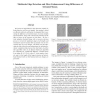Free Online Productivity Tools
i2Speak
i2Symbol
i2OCR
iTex2Img
iWeb2Print
iWeb2Shot
i2Type
iPdf2Split
iPdf2Merge
i2Bopomofo
i2Arabic
i2Style
i2Image
i2PDF
iLatex2Rtf
Sci2ools
ICCV
2007
IEEE
2007
IEEE
Multiscale Edge Detection and Fiber Enhancement Using Differences of Oriented Means
We present an algorithm for edge detection suitable for both natural as well as noisy images. Our method is based on efficient multiscale utilization of elongated filters measuring the difference of oriented means of various lengths and orientations, along with a theoretical estimation of the effect of noise on the response of such filters. We use a scale adaptive threshold along with a recursive decision process to reveal the significant edges of all lengths and orientations and to localize them accurately even in lowcontrast and very noisy images. We further use this algorithm for fiber detection and enhancement by utilizing stochastic completion-like process from both sides of a fiber. Our algorithm relies on an efficient multiscale algorithm for computing all "significantly different" oriented means in an image in O(N log ), where N is the number of pixels, and is the length of the longest structure of interest. Experimental results on both natural and noisy images are ...
Computer Vision | Efficient Multiscale Algorithm | Efficient Multiscale Utilization | ICCV 2007 | Noisy Images | Oriented Means | Recursive Decision Process |
Related Content
| Added | 14 Oct 2009 |
| Updated | 14 Oct 2009 |
| Type | Conference |
| Year | 2007 |
| Where | ICCV |
| Authors | Meirav Galun, Ronen Basri, Achi Brandt |
Comments (0)

